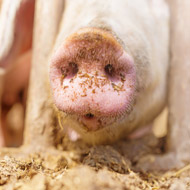Camera system could alert farmers to tail biting

Tail biting occurs unpredictably and can spread rapidly through the litter.
A camera-based system to identify signs of tail biting in pigs could help farmers prevent outbreaks, according to new research.
Writing in the journal PLOS ONE, researchers show that pigs hold their tails down and close to their body when tail biting is about to begin. In a series of experiments, researchers placed 3D cameras above feeders to automatically measure when the pigs’ tails were up and curly, or held down.
The study was conducted using 23 groups of pigs that were regularly scored for signs of injury to their tail. Researchers monitored the pigs closely and put a stop to the tail biting as soon as they detected an outbreak.
Tail biting is a financially devastating problem, of which there is no single cause. Elements of the pig’s genetics, nutrition, environment and management are all thought to contribute to its spread.
When an outbreak of tail biting occurs, it does so unpredictably and can spread rapidly through the litter. Tail docking was once used as a measure to control the disease, however this is no longer seen as an acceptable solution.
“Tail docking of piglets is partly effective at reducing tail biting in later life, but is seen as an undesirable mutilation and its routine use is banned in the EU,” explained lead author Dr Rick D’Eath from Scotland’s Rural College (SRUC).
“This research has achieved everything we hoped for. We can automatically measure tail posture, and we’ve proved it can act as an early warning of tail biting. The challenge for us now is to develop this promising technology into a robust on-farm early warning system that works on any pig farm.”
The concept is now set to be developed into a project called “TailTech” funded by Innovate UK. The project will gather data from more diverse pig farms and develop and test a prototype early warning system.



 The latest
The latest